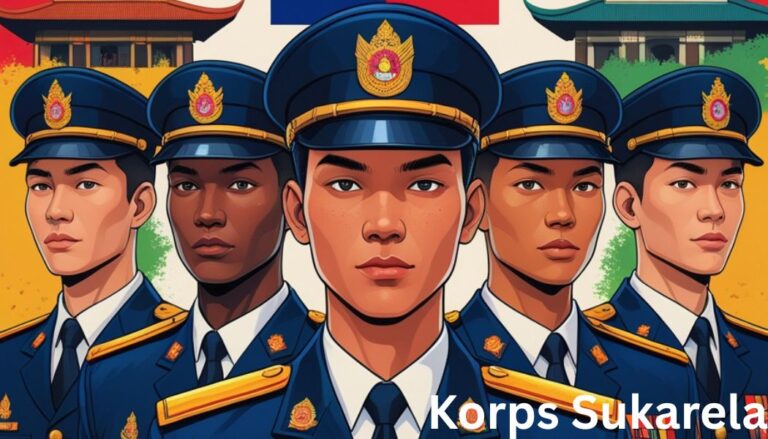In the vast and vibrant archipelago of Indonesia, where community and mutual cooperation are deeply ingrained in the cultural fabric, the spirit of “gotong royong” (working together) finds one of its most potent expressions in the Korps Sukarela. Translating directly to “Voluntary Corps” or “Volunteer Corps,” this term represents far more than just a name; it signifies a powerful movement of selfless individuals dedicated to the service of others. Often synonymous with the volunteer units of the Indonesian Red Cross, the Korps Sukarela embodies a national ethos of compassion, resilience, and community.
The Meaning and Ethos of Voluntary Service
The term itself is elegantly straightforward. “Korps” denotes a organized body of people, a unit working with a common purpose. “Sukarela” carries the beautiful meaning of voluntary action driven by willingness and desire, not compulsion or expectation of reward. Together, “Korps Sukarela” defines a collective driven by the pure intention to contribute to the greater good. This is not a profession but a calling—a commitment to uplift society through the gift of one’s time, energy, and skills.
This spirit of volunteerism is a cornerstone of Indonesian society, echoing the ancient principle of “gotong royong.” It is the idea that the well-being of the community is the responsibility of all its members. The Korps Sukarela formalizes this principle, creating structured channels through which this innate desire to help can be effectively and efficiently directed to where it is needed most.
A Multifaceted Mission: The Purpose and Activities
The overarching purpose of the Korps Sukarela is to foster a robust culture of giving back and to build a more resilient society. Its volunteers are the unsung heroes who operate on the front lines of community welfare, engaging in a remarkably diverse range of activities.
1. Disaster Response and Humanitarian Aid: Indonesia is a nation prone to natural disasters, including earthquakes, volcanic eruptions, tsunamis, and floods. In these critical moments, the Korps Sukarela, particularly those integrated with the Indonesian Red Cross (Palang Merah Indonesia, or PMI), spring into action. Their activities are vital and often life-saving. They are trained in:
- Search and Rescue: Locating and evacuating victims from dangerous areas.
- First Aid and Medical Assistance: Providing immediate medical care to the injured, setting up field hospitals, and assisting in mass casualty situations.
- Logistics and Distribution: Managing the supply chain for essential items like food, clean water, blankets, tents, and hygiene kits, ensuring aid reaches the most vulnerable.
- Psychosocial Support: Offering comfort and basic emotional support to survivors, including children, who have experienced trauma.
2. Community Service and Event Organization: Beyond disaster response, the Korps Sukarela is deeply embedded in the day-to-day life of communities. They are the backbone of local events and public health initiatives. Their work includes:
- Blood Donation Drives: Organizing and facilitating blood donation events, a crucial activity for maintaining national blood supplies.
- Health Education: Conducting campaigns and workshops on topics like disease prevention, healthy living, and first aid training for the public.
- Public Safety at Events: Providing first aid and emergency medical services during large public gatherings, such as national celebrations, religious festivals, and sporting events.
- Environmental and Social Programs: Participating in community clean-ups, tree planting, and other initiatives aimed at improving local welfare.
Through these activities, the Korps Sukarela doesn’t just provide services; it strengthens community bonds and empowers citizens to take an active role in their own well-being.
The Vital Link: Association with the Indonesian Red Cross (PMI)
While “Korps Sukarela” can be a general term for any volunteer corps, it is most prominently and formally associated with the Korps Sukarela (KSR) Unit within the Indonesian Red Cross (Palang Merah Indonesia – PMI). The PMI is the official national humanitarian organization in Indonesia, recognized by the government and a part of the International Red Cross and Red Crescent Movement.
This association is significant. It means that volunteers within the KSR-PMI are not just well-intentioned individuals; they are trained, standardized, and equipped according to international humanitarian principles. They operate under the emblem of the Red Crescent, which grants them protection and recognition in the field. Membership in the KSR-PMI involves rigorous training in international humanitarian law, the fundamental principles of the Red Cross/Red Crescent (humanity, impartiality, neutrality, independence, voluntary service, unity, and universality), and technical skills like advanced first aid and disaster management.
This formal structure ensures that when a disaster strikes, the response is coordinated, professional, and effective. It transforms raw passion into skilled competence, maximizing the positive impact of every volunteer’s effort.
The Unsung Backbone of Resilience
The members of the Korps Sukarela are everyday citizens from all walks of life—students, professionals, homemakers, and retirees. They wear no uniform of pride, only the quiet satisfaction of duty fulfilled. They train tirelessly, often sacrificing personal time and comfort, not for accolades, but for the preparedness to act when crisis looms.
They are the embodiment of the nation’s heart, a living testament to the power of collective action. In a world often focused on individual gain, the Korps Sukarela stands as a powerful reminder that the true strength of a nation lies in the willingness of its people to stand together, to support one another, and to build a safer, kinder, and more compassionate society for all. They are not just a voluntary corps; they are the guardians of community spirit and the undeniable force of humanity in action.

